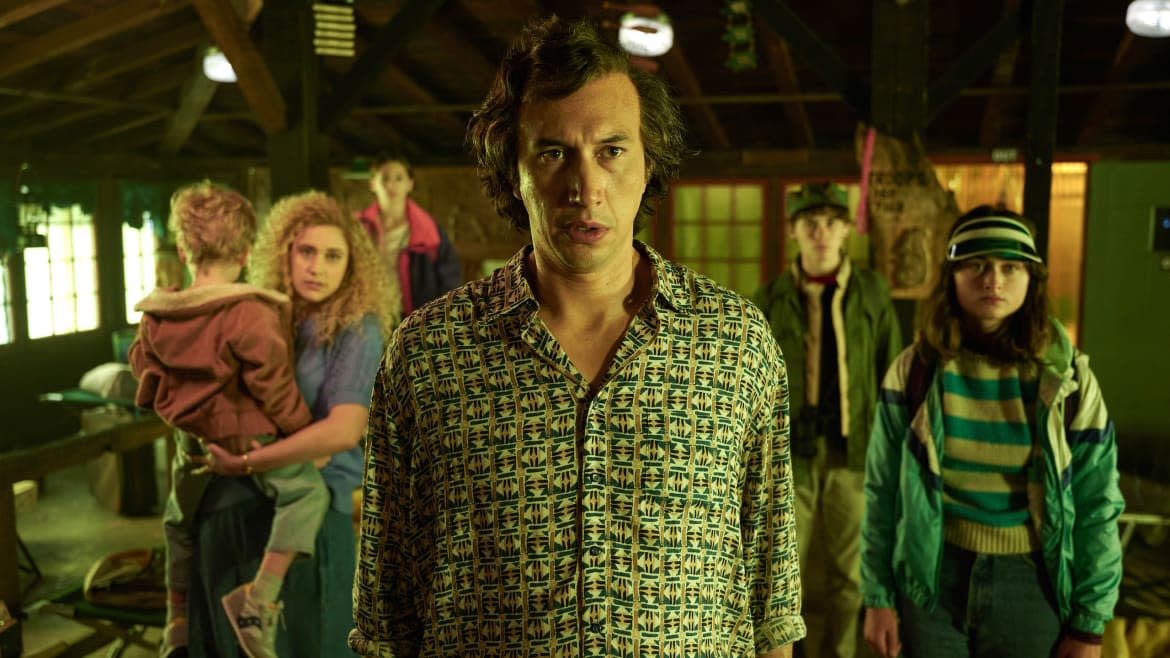‘White Noise’ Is One Dark, Messy Satire of America

You’ll want to stay through the end credits of White Noise, filmmaker Noah Baumbach’s adaptation of Don DeLillo’s much-ballyhooed novel exploring the torpefying effects of mass consumerism, technology, and medical quackery on the American family. It is a sequence straight out of David Byrne’s Broadway romp American Utopia, bursting with ingenuity and playfulness, set to a catchy new tune by LCD Soundsystem. It also says more about how in thrall we are to consumption than the rest of the movie combined.
White Noise is told from the perspective of Jack Gladney (Adam Driver), chairman of the Hitler Studies department at fictional College-on-the-Hill. The year is 1984, and we are 16 years into his tenure—one marked by adulation from his fellow colleagues and students alike. Gladney is an imposing figure (see: Driver), dazzling his students with histrionic lectures and stalking the hallways in a black robe, though his propensity for hiding his hands underneath it, and cloaking himself in polarized sunglasses, suggests a lingering insecurity. His wife is Babette (Greta Gerwig), a seemingly content mother presiding over a mixed brood of children and stepchildren with an absolutely glorious head of curly blonde hair. Her secret addiction to a mystery prescription pill called Dylar, however, indicates that there’s anxiety bubbling beneath her cheery surface.
This opening chapter sees Baumbach in familiar territory: dismantling the pretensions of academia, where professors luxuriate in language in ways that feel masturbatory to anyone outside their finely constructed bubble. It opens on Professor Murray Siskind (Don Cheadle, outstanding) gushing over an orgiastic montage of movie car crashes, casting them as a paragon of American “optimism” and urging his acolytes to “look past the violence”—laughably absurd advice, of course. An early highlight comes via dueling lectures from Gladney and Siskind juxtaposing the lives of Elvis and Hitler, positing that their mommy issues led to a hunger for mass adoration. Parallels will inevitably be drawn between Gladney and Bernard Berkman, the teacher and literary dinosaur embodied by Jeff Daniels in The Squid and the Whale whose ego is only outmatched by his love for the Knicks, even if Gladney is far less of a cultural Luddite (Berkman was loosely based on Baumbach’s own father, a fiction writer who later taught at Brooklyn College).
When a truck loaded with toxic chemicals plows into a train, a “black billowing cloud” with flashes of red forms over their pastoral town. Dubbed “The Airborne Toxic Event,” the environmental catastrophe sends Gladney, Babette, and their clan—along with the rest—to a far-away quarantine site called Camp Daffodil. It is here that Gladney comes to the realization that his children are smarter and more self-assured than he and Babette, and the film’s tone (and photography) shifts to a science-fiction sendup in the vein of early Stranger Things, casting its characters in glowing lights, caliginous shadows, and wide shots. This chapter is where White Noise starts to unravel, as Baumbach loses sight of DeLillo’s sharp satirization of American mores in the trappings of period sci-fi.
White Noise is surely Baumbach’s most ambitious outing to date—a sprawling critique of U.S. culture and its enslavement to consumerism, tabloid fictions, miracle “cures,” and the power of technology, all of which have led to the disintegration of family structures. In our current pandemic hellscape—what with a deadly airborne virus, mass paranoia, quarantining, doomscrolling on social media, pill-pushing grifters, and Amazon deliveries—the material couldn’t be timelier. It’s too bad, then, that the film’s attempts at social commentary are largely lost amid its turgid verse and meandering plot. Much like Cosmopolis, David Cronenberg’s 2012 stab at DeLillo, White Noise is too enamored of the author’s gift for fanged, sardonic dialogue, rendering its own indigestible.
“Family is a cradle of the world’s misinformation,” Gladney asserts over and over again. And Baumbach remains gifted at dramatizing the pangs of familial dysfunction, as when Driver and Gerwig (terribly underutilized) bicker in bed over the use of “entry” as a term for sex in dime-store romance novels, or in his previous film Marriage Story, a sharp, achingly personal portrait of marital destruction. White Noise is the filmmaker operating at a distracted remove—one that never manages to capture the right frequency.
White Noise will debut in theaters on Nov. 25 and stream on Netflix Dec. 30.
Get the Daily Beast's biggest scoops and scandals delivered right to your inbox. Sign up now.
Stay informed and gain unlimited access to the Daily Beast's unmatched reporting. Subscribe now.

 Yahoo News
Yahoo News 
